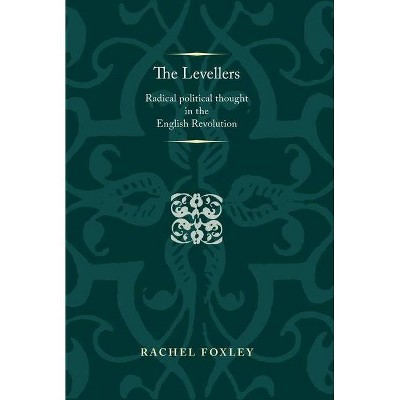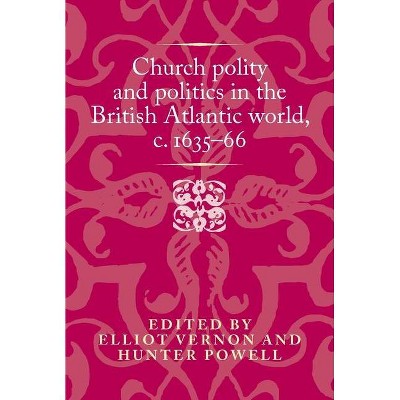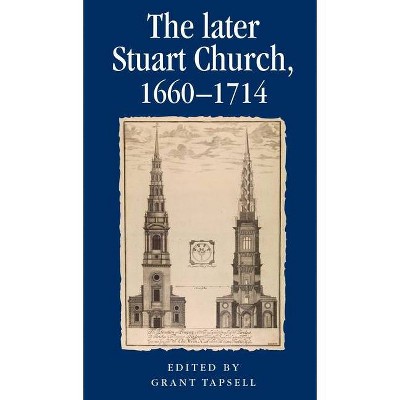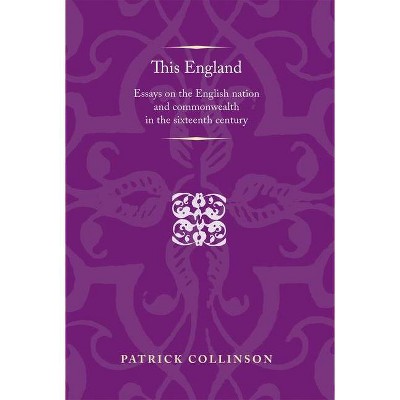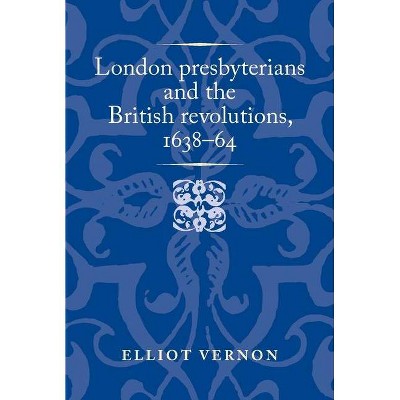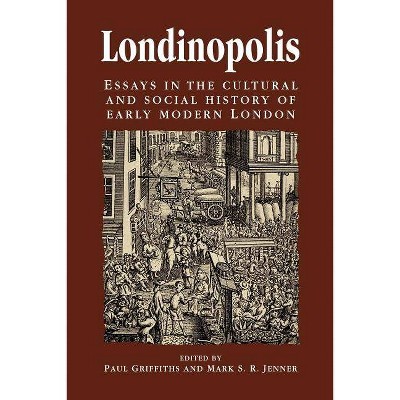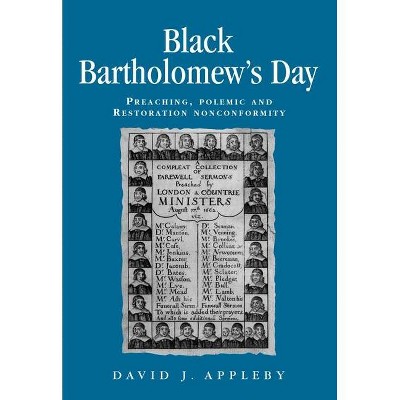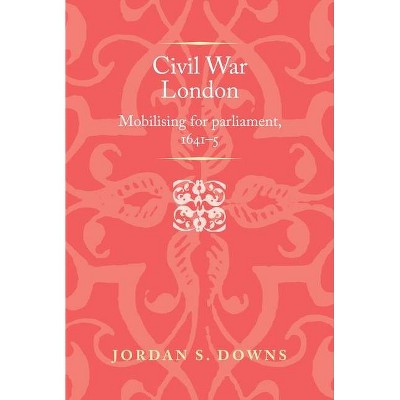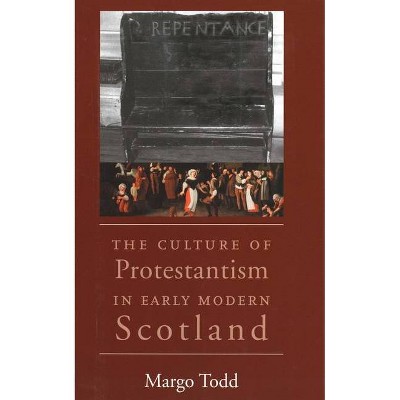The Crisis of British Protestantism - (Politics, Culture and Society in Early Modern Britain) by Hunter Powell (Paperback)
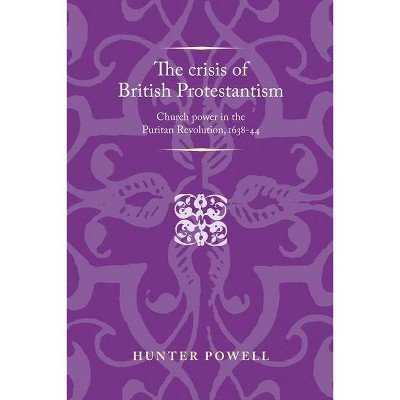
Similar Products
Products of same category from the store
AllProduct info
<p/><br></br><p><b> About the Book </b></p></br></br>Focuses on the pivotal years of 1638-44 where debates around non-conformity within the Church of England morphed into a revolution between Parliament and its king<p/><br></br><p><b> Book Synopsis </b></p></br></br><p>This book straddles a crucial divide in British history, as calls for religious reform and renewal mutated into political revolution. It seeks to bring coherence to a pre-revolutionary historiography that focuses on questions of conformity to and (semi-)separatism from 'the church by law established' and a post-1642 historiography built around a coarse polarity of 'Presbyterian' and 'Independent', and modern notions of religious toleration. <br /> <br /> This book argues that the fundamental ecclesiological issue in 1638-44 was the question of church power. Once Parliament conceded that ecclesiastical power did not reside in the diocesan bishop, the state, along with its leading puritan divines, needed to isolate where church power existed and how that power was executed. Parliament wanted a church that would stymie a clerical usurpation of state control, but could equally fend off the burgeoning call for separation of church and state. When Parliament called the Westminster assembly of divines, it knew that one of the most destabilising elements of the body politic was an inchoate national church, where heterodoxy presented as much of a threat as prelacy. <br /> <br /> This book rigorously examines this pivotal moment of religious reform by analysing a small but vitally important group of these assembly divines, their writings, and their private interaction as Parliament began national church reform in the midst of a civil war. It challenges many long-held assumptions surrounding religious and political debates during the Puritan Revolution and will provide a new framework for both students and teachers to understand one of the most important moments in British history.</p><p/><br></br><p><b> From the Back Cover </b></p></br></br>This book straddles a crucial divide in British history, as calls for religious reform and renewal mutated into political revolution. It seeks to bring coherence to a pre-revolutionary historiography that focuses on questions of conformity to and (semi-)separatism from 'the church by law established' and a post-1642 historiography built around a coarse polarity of 'Presbyterian' and 'Independent', and modern notions of religious toleration. This book argues that the fundamental ecclesiological issue in 1638-44 was the question of church power. Once Parliament conceded that ecclesiastical power did not reside in the diocesan bishop, the state, along with its leading puritan divines, needed to isolate where church power existed and how that power was executed. Parliament wanted a church that would stymie a clerical usurpation of state control, but could equally fend off the burgeoning call for separation of church and state. When Parliament called the Westminster assembly of divines, it knew that one of the most destabilising elements of the body politic was an inchoate national church, where heterodoxy presented as much of a threat as prelacy. This book rigorously examines this pivotal moment of religious reform by analysing a small but vitally important group of these assembly divines, their writings, and their private interaction as Parliament began national church reform in the midst of a civil war. It challenges many long-held assumptions surrounding religious and political debates during the Puritan Revolution and will provide a new framework for both students and teachers to understand one of the most important moments in British history.<p/><br></br><p><b> Review Quotes </b></p></br></br><br>'This is a clever, clear disquisition on complex matters of theology, skilfully tracked through the works of key authors and pamphlets, wedded to the debates in the Westminster Assembly. It is not a book for the faint-hearted, however, for this is rarefied theological stuff.' Andrew Foster, <i>University of Kent, June 2016</i> 'This is an excellent book that will be required reading for anyone who wishes to understand the religious and. more importantly, the ecclesiological debates that roiled the English Puritan clergy in the 1640s.' Michael Finlayson, The American Historical Review, 2016 '...Powell has written a book that those concerned with understanding the internal dynamics of the Puritan revolution will need to read.' -- Grant Tapsell, Journal of British Studies, 2016 '... this is a fine work of scholarship, and it will surely become essential reading for those investigating the religious politics of the British Isles at a critical moment in their histories.' James Mawdesley, Reviews in History, 2016 '...Powell has provided provided a series of fresh and penetrating perceptions of which all students of Civil War Puritanism will need to take account.' -- Blaire Worden, History, 2016 'The crisis of British Protestantism is a valuable 'thick description' of the critical debate on church power in the mid-seventeenth century crisis. Powell's reading provides fresh insight into these critical debates and comprehensibly challenges much of the received wisdom on the subject.' London Elliot Vernon, Journal of Ecclesiastical History <i>'The Crisis of British Protestantism</i> is well-written, in places beautifully written... I heartily commend the careful reading of what is easily one of the most interesting studies in the history of ecclesiology in recent years and the single most significant study of the debates and personalities in the Westminster assembly in many years.' Chad Van Dixhoom, JETS, July 2016 'This is likely the most significant work written to date on the thorny subject of church power in British Reformed orthodoxy. Powell focuses on debates over the nature of church power primarily from 1638-1644 (p. 2). He aims to redefine and to clarify categories related to debates over church government at the Westminster Assembly. He does so by treating primarily the view of the so-called five "dissenting brethren" in relation to the Scottish commissioners, setting both their historical context. This is such a paradigm shifting work that it is one of the most important books that anyone interested the Westminster Assembly and its theology could take up and read. It shows how Westminster debates over church government were not as neat and tidy as many have assumed and how the question of church polity fits into the broader context of Reformed orthodox theology.' Ryan McGraw, Puritan Reformed Journal, November 2017 'This challenging text is a welcome addition to the field. It unsettles a number of enduring stereotypes and presents the process of negotiation and debate at the Westminster Assembly (and beyond) in a considered manner. [...] I eagerly await the next instalment.' Chris R. Langley, Newman University, Birmingham, EHR, February 2018 'This is an outstanding book which makes a significant contribution to our understanding of the debates which surrounded the early years of the Westminster Assembly of Divines.' Neil McIntyre, University of Glasgow, Innes Review<br><p/><br></br><p><b> About the Author </b></p></br></br><br>Hunter Powell is an Independent Scholar<br>
Price History
Price Archive shows prices from various stores, lets you see history and find the cheapest. There is no actual sale on the website. For all support, inquiry and suggestion messages communication@pricearchive.us
